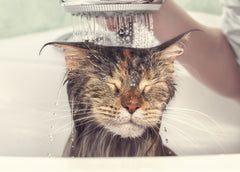Do I need to vaccinate my cat? Everything you need to know
The topic of vaccinations is a source of uncertainty for many cat owners. Does my cat really need vaccinations? Which ones are essential and which are optional? Especially if you want to keep your cat healthy and fit, it's worth taking a closer look.
In this blog you will learn everything you need to know about vaccinating cats : which vaccinations are necessary, what the costs are and why even indoor cats cannot survive completely without protection.
Why should I vaccinate my cat?
Vaccinations protect cats from dangerous diseases that can often be life-threatening. Through vaccination, the body produces antibodies against certain pathogens, making it better prepared.
The benefits of vaccination:
- Protection against serious diseases such as cat flu or feline distemper.
- Reduction of symptoms of disease if the cat does become infected.
- Protecting other cats from infection.
- Increasing life expectancy through prevention.
Which vaccinations are important for cats?
There are two categories of vaccinations for cats: core vaccinations (essential) and non-core vaccinations (optional depending on lifestyle).
Core vaccinations for all cats
These vaccinations are important for every cat – regardless of whether they live indoors or outdoors:
-
Feline panleukopenia
- Highly contagious and often fatal.
- Symptoms: fever, vomiting, diarrhea.
-
Cat flu (herpes and calicivirus)
- A common disease, especially in kittens.
- Symptoms: sneezing, eye discharge, fever.
Tip: These vaccinations are part of the basic immunization and should be started for kittens from the 8th week.
Non-core vaccinations – as needed
These vaccinations are optional, but recommended for outdoor cats and cats at risk:
-
rabies
- Mandatory for outdoor cats and when traveling abroad.
- Protection against a deadly viral disease that also affects humans.
-
Leukemia (FeLV)
- A contagious viral infection that weakens the immune system.
- Important for outdoor cats or multi-cat households.
-
FIP (Feline Infectious Peritonitis)
- An often fatal disease caused by a mutated coronavirus.
-
Chlamydia
- Respiratory and eye infections, especially in multi-cat households.
How often does a cat need to be vaccinated? The vaccination schedule at a glance
A good vaccination schedule is crucial for protecting your cat. Here's an overview:
-
Kittens:
- Week 8: Cat flu + feline distemper
-
- Week: Recurrence of cat flu + feline distemper + possibly rabies
-
Adult cats:
- Annual booster for cat flu and feline distemper.
- Rabies every 1–3 years, depending on the vaccine.
-
Outdoor cats:
- Additional protection against rabies, leukemia and chlamydia.
Tip: Talk to your veterinarian to create a personalized vaccination plan that suits your cat.
Costs for vaccination in cats
An important consideration is the cost of vaccinating cats . These vary depending on the veterinary practice, region, and type of vaccination.
| Vaccination | Costs (approx.) |
|---|---|
| Cat flu/disease | 40–60 € |
| rabies | 30–50 € |
| Leukemia | 40–60 € |
| Chlamydia | 30–40 € |
Additional costs:
- Veterinary examination: approx. €20–30.
- Combination vaccinations are often cheaper than individual vaccinations.
Tip: Basic immunization may incur slightly higher costs because several vaccinations are necessary.
Vaccinating cats: Does an indoor cat also need to be vaccinated?
Indoor cats also need vaccinations—albeit less than outdoor cats. Why?
- Pathogens can be introduced: Viruses enter the house via shoes, clothing or other pets.
- Veterinary visits: Cats can easily become infected in the waiting room.
- Emergencies: If your cat runs away or needs to go to a kennel, it is at risk without vaccination.
Conclusion: Indoor cats should also be vaccinated against cat flu and feline distemper.
Side effects of a vaccination – what you should know
Vaccinations are generally safe. However, as with humans, side effects can occur:
- Slight swelling at the injection site
- Fatigue or loss of appetite
- Fever (rare)
Serious side effects such as allergic reactions are extremely rare. If your cat shows any unusual symptoms, you should contact your veterinarian immediately.
Frequently asked questions about vaccinations for cats
“How long does the vaccination protection last?”
Protection varies depending on the disease and vaccine. Boosters are usually recommended annually.
“Is vaccination mandatory?”
In Germany, there is no compulsory vaccination for cats, but rabies vaccination is mandatory when traveling abroad.
“Can I skip the vaccination?”
Without vaccination, you expose your cat to unnecessary, avoidable risks.
Conclusion: Vaccination protects your cat and you
The question "Do I need to vaccinate my cat?" can be answered clearly: Yes! Vaccinations are a basic part of preventative health care and protect your cat from dangerous diseases.
The most important points summarized:
- Core vaccinations such as cat flu and feline distemper are a must.
- Outdoor cats should also be vaccinated against rabies and leukemia.
- Indoor cats also need basic protection.
- The costs are manageable and a small price to pay for your cat's health.
Invest in your cat's vaccinations – because prevention is always better than cure. This way, you can ensure your pet stays healthy and happy! 🐾

















